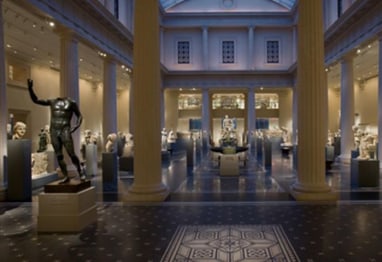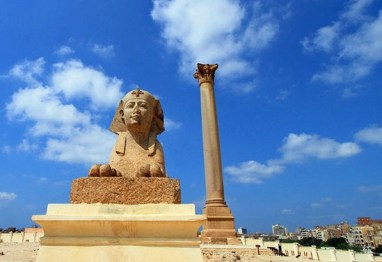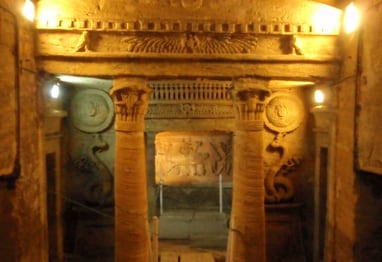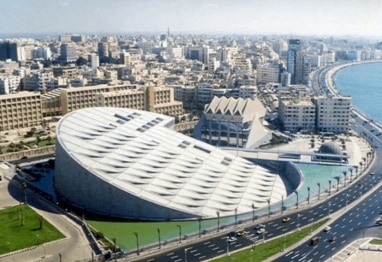
The Roman Amphitheatre of Alexandria
The Roman Theater is one of the most famous monuments in Alexandria, and while the amphitheatres spread in different countries such as Greece, Italy and Turkey during the Roman era, the Roman ...
Few towns in the world have impacted western history as much as this one; the home of the first ever library. Head in to walk in the footsteps of Alexander the Great in the company of a qualified tourHQ guide.
Search Cities in egypt

The Roman Theater is one of the most famous monuments in Alexandria, and while the amphitheatres spread in different countries such as Greece, Italy and Turkey during the Roman era, the Roman ...

Amongst the gazillion logistics that need to be taken care of while planning for a tour, one key decision that people usually find themselves resistant to is hiring a guide. Especially, if you ...

Egypt is a country of unlimited possibilities, we are saying. And definitely, it is. Egyptians can be very friendly and helpful to you. However, while expecting their help and cooperation, you should ...

Alexander the Great, with his incredible thirst for conquest, brought Egypt into the orbit of the Greek world. From this point on, a series of battles followed one after another that led first to ...

During the Second Intermediate Period (1650–1550 BC), Egypt was weakened by the immigration of the Hyksos people from the east. They established a dynasty in Lower Egypt and the Nile Delta, keeping ...

The Middle Kingdom of Egypt is also known as the “Reunification period”, and it started from 2050 BC until 1710 BC. This period starts with the eleventh dynasty under the reign of Mentuhotep II ...

The Old Kingdom of Egypt started in 2650 and lasted until 2150 BC. For more than 400 years, Egypt had a strong central government and economy. The most famous thing about the Ancient Egypt ...

The Eye of Horus is Like a talisman, it symbolizes health, prosperity, and the immortality of the body, as well as the ability to revive the dead.

Wadi Natrun is a small town northwest of Cairo located on the edge of the western desert, halfway between the capital and Alexandria. It is located about 23 meters below sea level and was already ...

The only known Roman amphitheatre in Egypt is located in Kom El-Dekka, Alexandria. It is an extraordinarily well-preserved structure consisting of 13 terraces built in the traditional Greek style ...

Located in the heart of modern Alexandria, the Greek-Roman Museum houses about forty thousand objects, which tell almost 1000 years of history, from the foundation of the city in 331 BC until the ...

Pompey’s pillar or the mast of a ship built in honour of Diocletian in 292 AD is located in Alexandria, in the area known as Kom El-Dekka, and dominates the area. On the base of the pillar, we find ...

The subsoil of Alexandria is riddled with a vast complex of catacombs and cisterns, fortunately, discovered in the early years of the twentieth century due to the disappearance of a donkey in a pit ...

The Great Library of Alexandria, established at the beginning of the 3rd century B.C., immediately after the foundation of the city, is supposed to contain over 500,000 texts. According to legend, ...

Alexandria has always been one of the holiday destinations to which the Cairoites flee in the summer months. The promenade is lined with elegant apartments and comes alive from June to ...
Hailed as the ‘Pearl of the Mediterranean’ for its curious cultural intermingling of Middle Eastern traditions and European character, Alexandria has stayed true to its history as a Greek colonial outpost on the coast of North Africa. The city was first established in 331 BC by Alexander the Great (who’s also its namesake), making it noticeably younger than most of the metropolitan centres in Egypt, but no less important in its line-up of historical and cultural points of interest.
But the story of this truly legendary city is both grand and tragic. Unfortunately much of the old Alexandria has been lost, consumed by the ever-encroaching ocean and the destructive course of history. Amongst the fallen, the majestic Pharos Lighthouse and the Royal Library Complex stand as perhaps its greatest and most lamentable losses.
But while the bulk of the ancient sites of Alexandria remain submerged at sea, there is something of a cultural revolution taking place on its modern streets. A number of planned museums, an exploding gastronomic scene and lively day-to-day atmosphere make it a truly enticing city that is worthy of its reputation.
Say Goodbye to Travel Stress